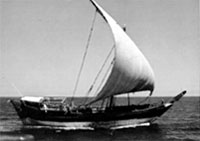
| Dedication |
|
|
| Preface |
|
|
| Contents |
|
|
| Personal
Tributes to Pascoal |
|
|
| Family Trees |
|
|
| About the Author |
|
|
| Home |
|
Meanwhile in Goa conditions were getting really bad. Bureaucracy was in a shambles. Except for agriculture and liquor distillation, no industry existed! What then were the job opportunities? Caste created its own barriers. The future held scant hope - particularly for those less-privileged, enslaved in bonded labour, weighed down by so many controls, and sadly denied any chance for education or betterment. Fortunately, greener pastures beckoned from beyond. Soon Luis' son, Caetano Maria, an ambitious youth, was infected by the fever of emigration that was attaining its pitch at the close of the century. But this time it was not just a move to another section of the village as his forebears had made. It meant crossing the barriers of his own native Goa. In the severe economic decline that had gripped this Portuguese enclave, the gradual trickle of earlier decades had at the latter part of the past century begun to assume the flood burst momentum of a general exodus. Outside Goa manifold opportunities for earning a livelihood awaited those who took up the challenge. British Rule in India was already established, and this was the period of consolidation. New railways, telegraphs, steamship companies, government administration and business firms - all required personnel.
Patimar (Sailing Boat) Jobs were for the asking, and Goans, particularly the Christians, with their wide exposure to the west, were seldom denied work under the British. Dhobie Talao and Cavel in Bombay were teeming with migrant Goans: a few well educated, several lacking formal learning - but all eager to advance. It was the same all over British India. One had to take the plunge and avail oneself of more recent conveniences. The once exhausting climb over the ghats, or the hazardous crossing over coastal waters in country-made "pattimars" or sailing ships, were now a thing of the past. Rail and steam-ship communication at this phase had greatly facilitated and expedited transport even at the height of the heavy monsoon. Moreover, by now the route was a well beaten track traversed by the more adventurous in the village. And to good and obvious advantage! Besides, leaving home would not be such a wrench - thanks to the innovative spirit of the Goan pioneers who had set in motion a most remarkable scheme of "kuds". Wherever the Goan went, his allegiance to his own far-away little village never faltered; and so he welcomed his country cousins to share his room, his acquired experience, and his guidance for their advancement. This fellowship was to mutual advantage, creating an atmosphere of home - so conducive to the aliens! Later-comers penetrated the Persian Gulf and East Africa where the British held sway, and which were in the process of development. Construction of the Kenya Uganda Railway towards the close of the 19th century greatly accelerated the influx of Goans into East Africa. They were not deterred by the hazards posed by an unfamiliar and inhospitable terrain, the fearful prospect of encounter with ferocious wild beasts, and passage through arid desert tracts. These intrepid pioneers paved the way for later generations for whom conditions were vastly improved. Moreover, by their industry, intelligence and integrity the Goans came to be favourably regarded by the British authorities. At the turn of the century quite a number of Anjuncares, including some from de Mello vaddo, were already seeking their fortunes in East Africa. Karachi Caetano Maria chose to go to Karachi, which at that time was included in the Bombay Presidency. He was certainly not the first Goan to get there. From an insignificant trading outpost Karachi had undergone development under the British and turned into a major commercial port. This attracted Goans who were seeking employment; they also kept coming in drawn there by the formation of the Indus Flotilla in 1850, the opening of the Suez Canal in 1869, the construction of the Lloyd Barage, and the creation of a separate province of Sind with its capital at Karachi in 1936. In fact, as far back as 1886, Goans were in so large a number there, that with a view to promote their unique culture and achieve mutual support, they set up the Goan Portuguese Association - later designated Karachi Goan Association. Being unlettered, Caetano Maria's choices were rather limited; but he was fortunate to find work with which he could cope. He ultimately found service in the household of an Englishman, (later Sir) Montgague Webb, General Manager of Forbes, Campbell & Co. And after some years, with his earnings, Caetano Maria was able to return home to his native Goa, and even to get married. He selected as his bride a girl from Soranto, very close to his own home in the village. Christalina De Souza was the daughter of Francisco De Souza and Severina Menezes. Unfortunately, in the circumstances, Caetano could not dream of taking his bride to Karachi with him. So she remained with his parents at home, in de Mello vaddo. In time Christalina and Caetano were blessed with three children : two daughters, and an only son - Pascoal! | ||||
|
